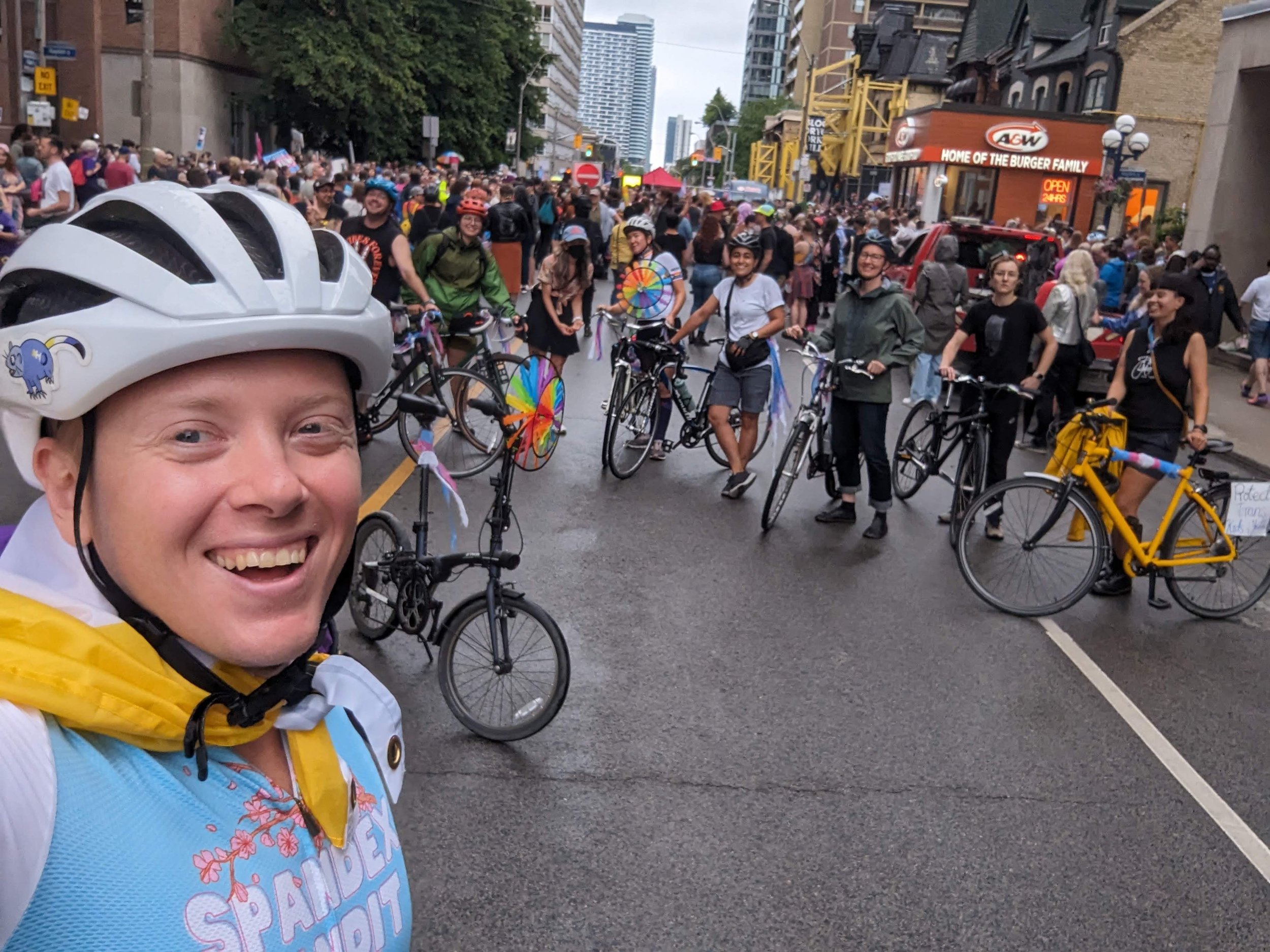Advocacy is For Everyone
People of all ages biking during Cycle Toronto's Bike to Work Day. Photo taken by Ry Shissler.
Change is almost universally difficult. Indeed, you may experience this annually in a visceral struggle with a New Years’ resolutions. However, I don’t want to talk about that personal kind of change. I’m more interested in systemic change — altering people’s perceptions and the physical representations of them for the betterment of everyone.Wow. That probably seems like a lot. And it is. Accepting the status quo and adjusting to it may seem like a much easier, pleasurable task, especially if your privilege grants you direct benefits from the situation. However, I would wager that on most days you find ways to advocate for yourself whether you know it or not.Consider a job interview; near the conclusion of a recent one, a panel member matter-of-factly informed me that I would need a car. Pausing, I questioned if a car was necessary to carry out duties of the job. They answered no. It became clearer why they asked the question as it was later revealed that none of the panel members lived in the city in which they worked. The panel members’ living circumstances barred them from using public transportation or the city’s web of bike lanes and multi-use paths. Using a car was their only option. They must have assumed it would be mine. I lightened the mood by sharing a story of my bike commutes in all weather — advocating for my ability to arrive without a car. In that moment our different perspectives were dissolved into shared expectations.This is advocacy—a ubiquitous force for positive change. It's a practice ingrained in nearly everyone to effect change in personal lives, advocating for oneself. I implore you to extend this lens of positive change to public life, whether as an individual or organization. Engaging in advocacy is a shared responsibility to enhance our communal spaces. The good news is, it doesn't have to be arduous.Pop-up bike repair station hosted by Cycle Toronto. Photo taken by Ry Shissler.
The Squeaky Wheel
In my advocacy tenure with Cycle Toronto, our focus lay on improving cycling infrastructure and policies, primarily at a municipal level. Conversations with elected officials often echoed variations of, "I support your proposals, but I'm not hearing support from my constituents." They were right. In people’s busy lives they get used to the ill-fitting dress that is their urban environment even though it makes them uncomfortable with every step they take.Frequently, there's opposition advocating against anything changing in cities and accepting the status quo is simpler when the alternative sparks community concern. A notable instance arose when, as one of his final acts as Toronto's mayor, John Tory stood in front of City Council arguing against bike lanes on Yonge Street. Despite the overwhelming majority favoring progress, a handful of local advocates, aligned with preserving the driving experience, swayed the mayor. It was easy. The Mayor had led a life of privilege that garnered him a position of immense power. The status quo worked for him. This emphasizes the need for those desiring change, and who have suffered from the status quo rooted in racism and misogyny, to voice their perspectives and for allies to listen and stand with us.Ry Shissler presenting at the Cycle Toronto Advocacy Forum. Photo taken by Robyn Hughes.
What are the benefits of public advocacy?
Individuals, businesses, and organizations often mold their lives around the status quo. Adjustments are made to allow the least amount of friction with it, be it purchasing a car for commuting, scheduling vacations during business slow periods, or organizing events in evenings and on weekends.Advocating for change, despite potential temporary hardships, is about creating a situation that fosters more for everyone. To achieve this, explore areas beyond your immediate experience. Question why things are the way they are and who or what you might be overlooking.In my work in transportation advocacy, the recurring justification for car ownership is "I need a car." While cars are practical tools, they're expensive, hazardous, and major contributors to air pollution. Unraveling the complexities of why people own cars requires probing deeper. It could be due to limited public transportation, hauling work equipment, unaffordable housing near services, or other reasons hindering alternative transportation. Advocating for changes, while posing short-term challenges, can significantly reduce the long-term hazards of car culture.This principle extends beyond personal life to businesses and organizations. Attracting more customers or enabling broader access to services often involves more than a refined marketing strategy. Physical barriers and urban design stand in the way.Consider a business whose clients are primarily women having a slow winter period due to sexist municipal snow clearing patterns. Or the necessity to schedule events at specific times due to racist public transit patterns. Operating under these circumstances might lead to adjustments without awareness or perhaps you toil on in frustration thinking nothing can ever change.The They Cycle team at the finish line of Hurtin in Haliburton, a bike race. Photo taken by Robyn Hughes.
Advocacy doesn't need to be hard
As a transgender athlete and the executive director of They Cycle—a supporter of queer cyclists in sports—advocacy is a core aspect of my role.Advocacy, especially in my position, can be challenging. Dealing with ignorance, dismissiveness, and occasional hate amid kindness and openness entails inherent trauma. However, engaging in advocacy does not always necessitate personal trials.At its essence, advocacy involves expressing belief in something. It could be as simple as sharing a well-written article to introduce new ideas or raising a hand in a work meeting to question accessibility for those with mobility issues.If intimate engagement feels uncomfortable, use your favourite search engine to find organizations* that can advocate on your behalf. There's an organization for almost every cause imaginable. Sign up for newsletters, add your name to petitions, use provided forms to email elected officials, or attend community-building events. It can even be fun to advocate for something you care about! And never forget that if you run a business or an organization that that voice matters too.A They Cycle event to encourage participation in the Ride to Trans Pride March. Photo taken by Ry Shissler.
What do you stand for?
While everyone possesses power, winning alone is almost impossible. Navigating change is intricate, and even with positive outcomes, the journey can be taxing. To alleviate this, take a step back, beyond the boundaries of projects, cities, nations, or even the planet. Ask, "What do I stand for?"An honest answer to this question unveils a more promising path to progress. While acute pain points exist, they are often symptoms of systemic issues. Addressing one problem without considering the broader picture risks transferring issues to someone else.In conversations with transportation advocates, many focus on the particular mode or project that directly affects them i.e. the bike lane near their home or the thoroughfare for their commute. They are advocating for something without considering broader principles of change that are desired. Stepping back and asking, "What do I stand for?" might reveal a shared desire for an urban environment that's safe, affordable, and easy to navigate—an idea almost everyone agrees on. This opens conversations to find the deeper values that align people with different views and allows you to find allies outside your community who can help shape what safe, affordable, and easy means to different people. These allies become crucial when faced with staunch opposition to change. Change is hard, but advocacy big or small can make it achievable.Cycle Toronto's Coldest Day of the Year Ride. Photo taken by Ry Shissler.
*I believe that it is important to recognize a few things about organizations whose primary purpose is advocacy:
Advocacy organizations with paid staff typically operate as nonprofits
Nonprofits are a major contributor to the gender pay gap due to them being primarily staffed by women, lower rates of pay compared to the for-profit sector, and a pay gap within the nonprofit sector
Nonprofits have much higher rates of staff that live with less privilege than the for-profit sector’s staff
This is all to say nonprofit workers need your support. They’re giving their lives to make our world a better place.







